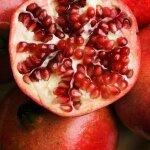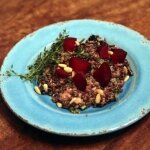
Probiotics are beneficial bacteria found in your intestinal tract. These natural gut flora are responsible for nutrient absorption and supporting your immune system. About 70-80% of your immune system is found in your gut, so keeping it healthy is critical for good health. Beneficial bacteria produce lactic acid, which inhibits the over growth of bad bacteria, keeping your digestive tract healthy. If you don’t have enough probiotics, the side effects could include: digestive disorders, skin issues, autoimmune disease and frequent colds and flu.
Historically, people consumed plenty of probiotics in their diet by eating fresh foods grown in quality soil, as well as by fermenting their foods to keep them from spoiling. However, today because of refrigeration, pasteurization, and dangerous agricultural practices like soaking foods with chlorine, our food contains little to no probiotics and most foods today actually contain antibiotics which kill off the good bacteria in our bodies.
By adding more probiotic foods into your diet, you could see all of the following health benefits:
- Stronger immune system
- Improved digestion
- Increased energy from production of vitamin B12
- Healthier skin, since probiotics improve eczema and psoriasis
- Reduced cold and flu
- Healing from leaky gut and inflammatory bowel disease
- Weight loss
8 Great Probiotic Foods
- Kefir – This milk-like probiotic food is similar to yogurt. It is a fermented dairy product, a unique combination of milk and fermented kefir grains. It has a slightly acidic and tart flavor and contains anywhere from 10 to 34 strains of probiotics. Kefir is similar to yogurt, yes, but because it is cultured after the milk is pasteurized, and with more bacteria, the final product is higher in probiotics (also, pasteurized yogurt often has diminished live cultures remaining).
- Cultured Vegetables (Sauerkraut and Kimchi) – This probiotic food can be made at home in mason jars… shred some cabbage, add some caraway seeds, and let stand in warm place for several days, and then you have a natural probiotic food. Sauerkraut is not particularly diverse in probiotics, but is high in organic acids (what gives food it’s sour taste), which support the growth of good bacteria. Kimchi is similar to sauerkraut and is the Korean take on cultured veggies. Both of the fermented formulas are also high in enzymes, which aid digestion.
- Kombucha – This is a fermented probiotic drink that has been around in Asia for over 2,000 years. It Is an effervescent fermentation of black tea that is started by using a SCOBY, also known as a symbiotic colony of bacteria and yeast. Kombucha offers digestive support and increased energy and liver detoxification.
- Coconut Kefir – This a dairy-free alternative to regular kefir. It is made by fermenting the juice of young coconuts with kefir grains. It has some of the same probiotics as traditional dairy kefir, but is typically not as high in probiotics. However, it still does have several strains that are great for your health.
- Natto – This probiotic food is popular in Japan, made from fermented soybeans. Natto contains the extremely powerful probiotic bacillus subtilis, which has been proven to bolster your immune system, support cardiovascular health and enhance digestion of vitamin K2. Natto also contains a powerful anti-inflammatory enzyme called nattokinase that has been proven to fight cancer.
- Yogurt – This is probably the most well-known and commonly accessible probiotic. Yogurt is made from the cultured milk of cows, goats, or sheep. In most instances, yogurt can rank at the top of probiotic foods if it comes from raw grass-fed animals. However, because there is a large variation on the quality of yogurts on the market today, this may not always be the case. Preferably, you should buy an organic, grass-fed yogurt.
- Kvass – Since ancient times, this has been a common fermented beverage in Eastern Europe. It has a mild sour flavor, and was traditionally made by fermenting rye or barley. In more recent years has been created using beets or fruit, along with other root vegetables like carrots. Kvass uses lactobacilli probiotics and is known for its blood and liver cleansing properties.
- Raw Cheese – Goat’s milk, sheep’s milk and grass-fed cows soft cheeses are particularly high in probiotics, including thermophillus, bifudus, bulgaricus and acidophilus. Always buy raw and unpasteurized cheeses if you want to receive the probiotic benefits.
























































